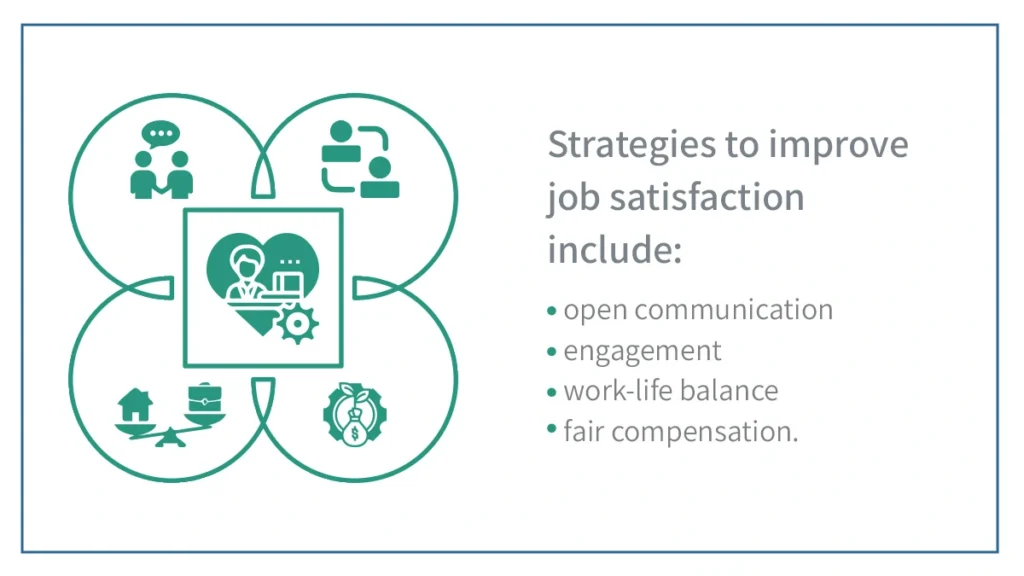Key to Quality Care: Employee Satisfaction

In the dynamic and demanding world of healthcare, providing excellent patient care and positive health outcomes are top priorities. However, it is crucial to consider one fundamental element in this equation: the satisfaction of healthcare employees.
This article will explore employee satisfaction within the healthcare industry, shedding light on its significance, the factors influencing it, and the strategies to enhance it. So, let’s embark on this journey to uncover the keys to a healthier and happier healthcare staff.
Key Takeaways
Employee satisfaction is a linchpin of a successful healthcare system. Here is what this article covers:
- Satisfied employees enhance patient care, productivity, and organizational efficiency while reducing turnover and costs.
- Factors influencing employee satisfaction include workplace environment, leadership, recognition, and benefits.
- Strategies to improve job satisfaction include open communication, engagement, work-life balance, and fair compensation.
Keep reading to learn strategies to promote medical staff well-being for better patient care and positive outcomes.

Importance of Focusing on Employee Satisfaction
Employee satisfaction is an important factor in the healthcare industry, with numerous benefits that extend beyond just the well-being of staff. Here, we’ll explore why prioritizing employee satisfaction is paramount in healthcare settings, such as hospitals and rehab centers.
Improved Patient Care
Satisfied healthcare employees are more engaged and motivated, translating into better patient care. When medical professionals are content with their jobs, they are more likely to provide high-quality, compassionate care, positively impacting patient outcomes.
Enhanced Productivity
Happy employees are productive employees. A satisfied healthcare workforce is more efficient, using resources better, reducing wait times, and ensuring patients receive timely care.
Improved Retention
Employee satisfaction is the primary driver of employee retention. When healthcare workers feel valued, they’re less likely to leave their current jobs. Lower turnover rates mean continuity in patient care and cost savings in recruitment and training.
Better Employee Health
A positive work environment and job satisfaction can contribute to improved employee health. Reduced stress, healthier lifestyles, and a work-life balance all play a part in reducing absenteeism and enhancing overall well-being.
Enhanced Job Performance
Content employees go above and beyond their roles, enhancing job performance. This, in turn, boosts the overall quality of healthcare services and patient experiences.
Positive Workplace Culture
Fostering a culture that values employee satisfaction promotes a positive and supportive work environment. A workplace culture that nurtures its employees’ well-being encourages collaboration and teamwork.
Patient Satisfaction
Satisfied healthcare employees are more likely to provide better patient care. This, in turn, results in increased patient satisfaction and a positive reputation for the healthcare facility.
Reduced Absenteeism
Reduced absenteeism is another benefit of employee satisfaction. Happy employees are less likely to call in sick, resulting in smoother healthcare operations.
Cost Savings
Higher employee satisfaction leads to cost savings. Reduced turnover rates, lower absenteeism, and increased productivity all benefit healthcare organizations financially.
Ethical and Responsible Behavior
Healthcare institutions prioritizing employee satisfaction tend to exhibit more ethical and responsible behavior. This not only benefits employees but also enhances the reputation of the institution.
Long-Term Success
Long-term success in healthcare is closely tied to employee satisfaction. Happy, motivated healthcare workers are more likely to stay with an organization, ensuring stability and success in the ever-evolving healthcare landscape.
Studies show that prioritizing employee satisfaction is not just an ethical choice; it’s a strategic one that leads to a healthier, more prosperous workplace.
Key Factors that Influence Employee Satisfaction
Employee satisfaction is the cornerstone of a successful healthcare workforce. Various factors play a pivotal role in determining the happiness and morale of healthcare employees, including doctors, nurses, and clinicians. Let’s explore the key influencers:
Nature of Work
The nature of an employee’s role and responsibilities can significantly impact their satisfaction. When employees are given clear and meaningful tasks, they feel a sense of purpose and accomplishment. On the other hand, unclear expectations and unrealistic workloads can lead to frustration and dissatisfaction.
Workplace Environment
The physical and social aspects of the workplace environment are crucial. A clean, safe, and well-maintained workspace contributes to employee well-being. Positive relationships with colleagues and a supportive, inclusive workplace culture are equally vital.
Leadership and Management
Effective leadership and management are critical to employee satisfaction. When employees feel heard and valued by their managers and supervisors, it fosters a sense of trust and respect. Conversely, poor leadership can lead to discontent, disengagement, and high turnover.
Recognition and Rewards
Recognition for a job well done and fair compensation play a substantial role in job satisfaction. Employees who receive acknowledgment and appropriate financial rewards for their efforts are more likely to be content and motivated.
Employee Benefits
Comprehensive employee benefits, such as healthcare coverage, retirement plans, and leave policies, ensure employee satisfaction. These benefits provide a sense of security and well-being, alleviating concerns about personal and family needs.
Professional Development Opportunities
Opportunities for growth and advancement are also crucial for job satisfaction. Employees with access to training sessions and development programs are more likely to feel valued and motivated to improve their skills.
By addressing these factors, healthcare organizations can create a more fulfilling and productive work environment, ultimately benefiting both employees and patients.
Strategies to Improve Employee Satisfaction
Improving employee satisfaction in the healthcare sector is a multi-faceted task that requires a combination of strategies and efforts. Here are some of the best ways to follow to enhance employee satisfaction:
Effective Communication
Open and transparent communication is the foundation of a satisfied workforce. Healthcare organizations should foster an environment where employees feel heard, understood, and informed. Regular team meetings, feedback mechanisms, and approachable leadership can facilitate effective communication.
Employee Engagement
Engaging employees in decision-making processes and providing opportunities for their input can boost morale. Employees who feel like an integral part of their organization are more satisfied with their work.
Work-Life Balance
Striking a balance between work and personal life is essential for health professionals who often deal with high-stress situations. Offering flexible work schedules, reducing overtime, and promoting time-off policies contribute to a healthier work-life balance.
Supportive Leadership
Effective leadership is pivotal. Leaders should be approachable, supportive, and empathetic. Encouraging professional growth, recognizing achievements, and offering mentorship programs can create a more supportive leadership environment.
Health and Wellness Programs
Implementing health and wellness programs can improve both physical and mental well-being. These programs can include fitness classes, stress management workshops, and mental health support, contributing to employee satisfaction.
Investing in Employee Development Programs
Providing opportunities for skill development and career advancement is a surefire way to enhance employee satisfaction. Offering training, workshops, educational assistance, and other necessary resources can help employees grow within their roles.
Providing Adequate Compensation and Benefits
Fair and competitive compensation packages and comprehensive benefits are fundamental to retaining satisfied employees. Adequate financial rewards and benefits, including healthcare coverage, retirement plans, and paid time off, demonstrate the organization’s commitment to its employees.
By implementing these strategies, healthcare organizations can create a win-win scenario where employees feel valued and motivated, and patients receive top-notch care.
Impact of Employee Satisfaction on Behavioral Healthcare
Employee satisfaction profoundly impacts the quality and effectiveness of behavioral healthcare services. Here are some key ways in which employee satisfaction can influence behavioral healthcare:
Quality of Care
Satisfied employees in behavioral healthcare are more likely to provide high-quality care. They are attentive, compassionate, and focused on patient needs, which directly enhances the overall quality of care. This leads to better outcomes and patient satisfaction.
Patient Engagement
Satisfied employees are the key to fostering patient engagement. They create a positive atmosphere, encouraging patients to participate actively in their treatment. A happy workforce is more likely to establish trusting relationships with patients, promoting open communication and a collaborative approach to healthcare decisions.
Productivity and Efficiency
Employee satisfaction can significantly impact productivity and efficiency in behavioral healthcare. Happy employees tend to be more motivated, reducing absenteeism and turnover rates. This stability enhances workflow consistency, allowing healthcare facilities to operate smoothly and deliver services more efficiently.
Patient Safety
Satisfied healthcare professionals are vigilant about patient safety. They are less likely to experience burnout and are more focused on adhering to safety protocols and best practices. This diligence translates into a safer environment for patients, reducing the risk of errors and adverse events.
Cost-Effectiveness
Employee satisfaction can contribute to cost-effectiveness in behavioral healthcare. Lower turnover rates mean reduced recruitment and training costs. Moreover, the improved quality of care and patient safety can lead to fewer complications and readmissions, ultimately saving resources.
Reputation and Attraction of Talent
A satisfied workforce enhances the reputation of a behavioral healthcare facility. Positive word-of-mouth from content employees can attract more patients and top talent. A strong reputation attracts professionals with a strong passion for providing high-quality care.
Positive Organizational Culture
Employee satisfaction cultivates a positive organizational culture that values teamwork, communication, and employee development. A healthy work environment can lead to better collaboration among medical staff, promoting a culture of significant improvements and learning.
Ensuring the well-being of healthcare providers is not only beneficial for the staff but is crucial for the overall success and effectiveness of the healthcare system in treating patients with behavioral health needs.
Frequently Asked Questions (FAQ)
Why is employee satisfaction important in healthcare?
Employee satisfaction in healthcare is crucial. Satisfied healthcare workers are more likely to provide better patient care. They stay in their jobs longer, reducing turnover costs. Happy employees are also less stressed, which can enhance patient safety.
Plus, they’re more inclined to go the extra mile to help patients, making the overall work experience better. Employee satisfaction in healthcare leads to improved patient outcomes and a more efficient healthcare system.
What is the satisfaction of healthcare professionals?
The satisfaction of healthcare professionals refers to how content and fulfilled they feel in their jobs. It includes factors like their work environment, relationships with colleagues and patients, job security, and the support they receive.
When healthcare professionals are satisfied, they are more likely to provide better care and positively impact patients’ well-being. Ensuring their satisfaction is vital for a well-functioning healthcare system.
How is employee satisfaction measured in healthcare?
Measuring the level of job satisfaction in healthcare involves various methods. Healthcare employee satisfaction surveys are a commonly used tool. These surveys include questions about job satisfaction, work environment, relationships with colleagues, and more.
Analyzing turnover rates and absenteeism can also provide insights. In addition, direct discussions with employees and focus groups can reveal their concerns and preferences. Measuring satisfaction helps healthcare organizations identify areas for improvement and create a more supportive and fulfilling work environment.
How do you keep healthcare employees happy?
To keep healthcare employees happy, consider these strategies:
Acknowledge their hard work and dedication to make them feel valued.
Encourage reasonable work hours and provide time for personal life.
Offer opportunities for skill growth and career advancement.
Ensure fair pay and benefits to show their worth.
Foster a culture of approachable and empathetic management.
Provide healthcare and wellness programs to promote well-being.
Maintain transparent channels for feedback and suggestions.
Ensure safety measures to protect employees and patients.
These actions create a happier healthcare workforce, ultimately improving patient care.
Join Our Journey Towards Employee Satisfaction Excellence!
At Haven Health Management, our commitment to excellence extends to our employees. We prioritize the satisfaction and well-being of our dedicated staff at all our facilities because we believe that happy employees are the foundation of exceptional patient care.
Join us in our mission to create a positive, supportive, and thriving healthcare environment for our team members. Together, we’ll continue to make healthcare better. Submit your resume for a chance to join our team today!
